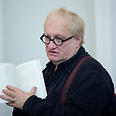
One of Germany's top publishers, Suhrkamp, released the travelogue "Allein Unter Deutschen" (Alone among Germans) by the Jewish writer in December, jamming a finger in the wound of one of the world's most fraught relationships.
Its thesis, that most non-Jewish Germans despise Jews deep down despite – or because of – nearly seven decades of atoning for the Holocaust, has attracted feverish interest from German media and even a few positive reviews.
Tenenbom has been compared to Woody Allen, Michael Moore and especially Sacha Baron Cohen, with his bumbling satirical character Borat, for eliciting jaw-dropping invective from seemingly civilized people.
Travelling for several weeks through Germany in the summer of 2010, the 55-year-old talked to celebrities and shopkeepers, professors and students, radical leftists and, now famously, neo-Nazis.
"Eight in 10," he told reporters in Berlin, when asked about the proportion of Germans who harbour "latent or subconscious" anti-Semitic beliefs, dismissing a study sponsored by parliament and released earlier this year showing the figure to be about two in 10.
'Ugly Jews controlling this land'
Tenenbom defines anti-Semitism as a belief that Jews hold vast power relative to their numbers, that they are obsessed with money and that Israel is solely or overwhelmingly responsible for the conflict with the Palestinians.
He insisted it didn't take much to get Germans to "drop the mask."
"If I call you and I say, 'Lady, what do you think of the Jews?', you say, 'Oh they are quite nice, they are good people'," he said.
"But you talk to people with beer and wine and a little schnapps, another beer, whatever they like to drink, then something else comes out: The ugly Jews who are controlling this land."
Book reviews have been decidedly mixed.
Newsweekly Der Spiegel in a lengthy article called it "a strangely entertaining portrayal of a German freak show. . . and yet Tenenbom wants the book to be seen as a dead-serious warning and indictment."
National daily Sueddeutsche Zeitung dismissed Tenenbom for portraying "everything Germany has to offer in the way of weirdos."
Tenenbom runs a Jewish theatre company in New York and writes columns for German, Italian and Israeli newspapers.
The son of Holocaust survivors acknowledges that Germany is not alone in Europe in having a problem with Jews but says its history makes it a unique case deserving special scrutiny.
"Germany is the one who acted on this anti-Semitism the strongest, 70 years ago," he said.
"In 1945 it was reduced to ashes, it was nothing, and Germany built itself all the way to the top today, it's the strongest, richest country in Europe. And my hope is that Germany will rebuild itself also mentally on the issue of anti-Semitism and that from Germany will come the light unto the nations."
Tenenbom fell out with another major publisher, Rowohlt, before Suhrkamp scooped up the rights.
Part of the problem was his visit to a neo-Nazi bar in northern Germany named Club 88 for the eighth letter of the alphabet, HH or Heil Hitler, in which he introduced himself as an American with German roots called Tobias.
Rowohlt said the technique was "illegal" because he didn't give his real name or ask for permission to quote his interlocutors spewing ugly propaganda.
"I couldn't say, 'Hello, I'm a Jew, how are you doing? Nice to meet you, would you like to kill me right now?'" Tenenbom joked.
"I'm like the Jews of the old generation," he said, holding up his hands in mock surrender.
'Pure, unfiltered truth'
Tenenbom, who self-published an English version of the book entitled "I Sleep in Hitler's Room", calls it a "critical but affectionate look" at Germans.
But he argues that political correctness has not just covered up average Germans' true feelings but allowed them to fester.
"It will be much easier to forge peace between Israelis and Palestinians and Arabs and Jews than to eradicate Jew hatred from the Germans," he wrote.
"The first two forms of Jew hatred are overt, you needn't expect any surprises there; the third covers itself in clever, complicated arguments and smoke and mirrors that blind the eye."
Hamburg's Abendblatt said it was "striking to be told by an outsider what you already know" and that Tenenbom's exaggerations served as a "means of getting to the bottom of things."
Meanwhile Jewish newspaper Juedische Allgemeine said the travelogue "contains the bitter nectar of the pure, unfiltered truth."















